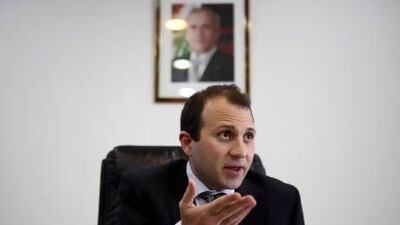'Our leaders can get away with not addressing or solving economic issues," says Nagy Rizk, a business developer and the son of a former Lebanese cabinet minister. "Subtle cultural, emotional or religious reactions can simply be triggered to steer any debate in a different direction and any criminal wrongdoing can be ironed out by side deals."
It is a neat definition of how things are done in Lebanon and one worth remembering as the government seeks to burnish its credibility by initiating a process that should see at least 50 foreign oil companies scramble to secure a chunk of the estimated 30 trillion cubic feet of natural gas sitting under the seabed off Lebanon's south coast.
This natural resource could generate anywhere between US$300 billion (Dh1.1 trillion) and $600bn and is surely the biggest economic opportunity in the country's short history.
There have already been teething problems with the opposition carping over the appointment process and salaries - about $16,000 a month - of the newly created six-man petroleum authority committee whose job it will be to oversee the tendering process and negotiate the drilling contracts.
The reason behind the uproar is that the energy ministry is run by Gebran Bassil, a man whose political career has been dogged by accusations of cronyism. However, I am told that, despite Mr Bassil's less than opaque record, the selection was, by Lebanese standards at least, transparent and the members are indeed qualified. The salaries are on a par with industry standards and justified - assuming they show up for work.
The real fear is that we blow our one chance at sustainable wealth by allowing compromise, side deals and sectarian interests to get in the way of what should be a straightforward process.
"The system is suboptimal and dysfunctional," says Mr Rizk. "If any good is going to come of this, if we are to mange our wealth responsibly and transparently, we need a game changer. Now is the time."
You might argue that the oil and natural gas reserves are by their very nature potential game changers, but Lebanon is a country where personalities define the future. And as it enters a new era, it needs someone to grip the situation and rewrite the rules. It's a big ask.
The late prime minister Rafiq Hariri was the closest we have come to a game changer in the past 20 years.
His decision to create a new Beirut, one to which the Arabs would flock, was what we needed at the end of the civil war. He knew the system, he wasn't a warlord and he had the money, the international profile and the connections to push through a difficult process.
Long before he was invited to lead the government in late 1992, Hariri was the name on everyone's lips. Today we have no Hariri. His son, Saad, had his chance after his father was murdered in 2005 but the optimism of the Cedar Revolution has all been snuffed out and he is now in semi-exile in Saudi Arabia.
It's a pity because although it may take up to five years before we start extracting the oil and gas, we can start the wealth creating process. We can start selling futures and prepare a framework for the allocation of funds.
Clearing Lebanon's $55bn national debt, infrastructure rehabilitation and creation of a sovereign wealth fund are the obvious priorities.
We could even follow the example of Norway with its state pension fund into which the surplus wealth produced by petroleum income is deposited. We could, but we probably won't.
The bleak conclusion is that Lebanon will plod along as it always has done until it throws up a leader who has the courage to change a very corrosive status quo by initiating open debate on the economy, imposing clear accountability and making prosperity a priority.
Michael Karam is a Beirut-based freelance writer

